Making the Grade
by Sandra Olivetti Martin
With the Bay at Stake, Does Political Balance In the Chesapeake Bay Commission Make for Murky Waters?
Putting Chesapeake Bay in the hands of the Chesapeake Bay Commission is like mixing foxes into the security force guarding the hen house — if you judge by the report cards just handed out by the Leagues of Conservation Voters in both Maryland and Virginia.
Set the passing grade at 70 percent like in school, and the majority of the Commission’s legislative members from the two states fail, according to a Bay Weekly analysis of scores.
Most members from Pennsylvania, the third state on the Commission, also failed their state’s last environmental rating in 2001-’02.
The Annapolis-based Commission — which has a staff of five supporting 21 commissioners and a budget this year of $480,000 — was set up 20 years ago as part of the effort to restore and better protect the Chesapeake Bay.
The Commission was one of six signatories to the original 1984 Chesapeake Bay Agreement, a regional commitment that created the Chesapeake Bay Program partnership and vowed to protect, as well as revive, the Bay’s ecosystem.
But judging from their legislative records, it’s clear that you don’t have to be a friend of the environment to be assigned to oversee the Bay.
“So much for the Commission members leading the charge for Bay-friendly legislation,” contends Howard Ernst, a professor at the U.S. Naval Academy and author of Chesapeake Bay Blues, the 2003 book credited with blowing the whistle on the Bay’s flagging restoration campaign.
Long-term failures in Chesapeake restoration have, over the last two years, triggered re-evaluation of how at this critical juncture we deal with the Bay in order to fix serious nitrogen pollution and rescue both crabs and oysters.
Ernst is among those who believe that entities dealing with the Chesapeake ought to be fully behind Bay restoration.
Others, like the Commission’s chairman, Maryland Sen. J. Lowell Stoltzfus, R-Eastern Shore, see the role of the Chesapeake Bay Commission as a balancer of interests.
Stoltzfus managed a paltry 13 percent rating from the League of Conservation Voters based on his votes on a dozen pieces of environmental legislation regarded as the most significant over the past two years.
For instance, Stoltzfus voted against several energy efficiency programs, including setting Maryland standards for appliances, state preferential purchasing and moving to renewable power sources. He also voted against increased penalties for violating water quality laws; holding the line on public transportation fares; and extending flush taxes to septic system users.
His two plusses were votes for creating the Bay Restoration Fund, the flush tax, to bring sewage treatment to the best technology possible in the state’s 60 biggest treatment plants; and for reaffirming protections for critical areas along Bay and other coastlines.
Stoltzfus said in an interview that those who cast him as anti-environment have it wrong.
“That’s not true. I’m actively involved in environmental issues, both personally, as the owner of probably the largest privately held tract in the Conservation Reserve Enhancement Program, and in getting agriculture in particular engaged in helping restore the Bay, especially in the last year.”
Stoltzfus also took issue with the League of Conservation Voters’ tests that he failed.
“On that scorecard, voting for more regulation seems to be the only measure of environmental achievement,” he said.
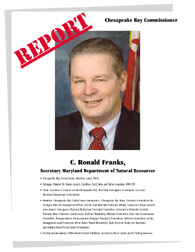 Scoring the Commission
Scoring the Commission
Each state’s seven-member delegation to the Commission includes five legislators — two senators and three delegates — plus a citizen and the governor's representative. In Maryland, legislative members are selected by their General Assembly leaders to serve indefinite terms. The citizen representative is former state senator Bernie Fowler, who’s been on the Commission since its founding. Representing the governor is Maryland Department of Natural Resources Secretary Ronald Franks.
Commission chairmanship rotates among the three states, with vice chairs representing the other states. Virginia’s vice chairman, Sen. Emmett W. Hanger Jr., a Republican, averaged 43 percent since 2000. On his state’s conservation scorecard he scored a high 60 percent in 2004, and a low 14 percent in 2003.
Four of Virginia’s five commissioners are Republicans, and all earned Fs by the old school standard. Sen. Nick Rerras set the low for Virginia Commission members with a 23 percent two-year score. Del. John Cosgrove scored 36 percent, and Del. Scott Lingamfelter 41 percent.
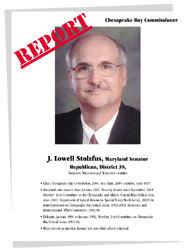 Four of Maryland’s five commissioners are Democrats. Two of them joined Republican Sen. Stoltzfus on the failing end of the scale. Del. John Wood Jr. (St. Mary’s and Charles counties) scored 45 percent.
Four of Maryland’s five commissioners are Democrats. Two of them joined Republican Sen. Stoltzfus on the failing end of the scale. Del. John Wood Jr. (St. Mary’s and Charles counties) scored 45 percent.
“I would never stand up and say I was 100 percent conservationist,” Wood told Bay Weekly. “I don’t always agree with them as far as issues and where they come from. You don’t close the door on development to protect something else or vice versa.”
Wood voted pro-environment on four out of nine issues on the House conservation scorecard. In addition to voting for the flush tax, he voted to override the governor’s veto on Maryland energy standards for applicances; increase penalties for violating water-quality and wetland laws; and promote public transportation by holding the line on fares.
But he voted against extending the flush tax to septic as well as sewer users and against moving the state a small step forward in buying electricity from renewable power sources.
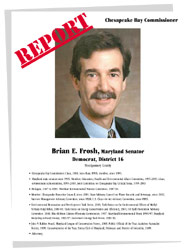 Fellow commissioner Michael Weir Jr., a first-term delegate who succeeded his father in the House and on the Commission, scored 67 percent, voting for seven out of nine conservation issues. In addition to the flush tax, Weir voted for higher water-quality violation penalties; holding the line on public transportation fares; environmentally friendly state purchases; and renewable energy.
Fellow commissioner Michael Weir Jr., a first-term delegate who succeeded his father in the House and on the Commission, scored 67 percent, voting for seven out of nine conservation issues. In addition to the flush tax, Weir voted for higher water-quality violation penalties; holding the line on public transportation fares; environmentally friendly state purchases; and renewable energy.
However, Weir voted against flush-taxing septic as well as sewer users and against overriding the governor’s veto on setting Maryland energy standards for applicances.
Weir is a member of the House Environmental Matters Committee. But as Maryland’s newest member on the Bay Commission he has not swept in on a wind of change.
“Environmentalist? I’m not in some respects, in that there’s extremes that I do not believe in going to,” he said.
In Pennsylvania — which contributes an estimated 20 percent of the Bay’s nitrogen pollution — Sen. Mike Waugh, a Commission vice chairman, scored just 20 percent on his state’s most recent scorecard. That was the same flunking grade registered by three other Pennsylvania members of the Commission.
“All the Commissioners are Republicans and are from rural areas,” said Pennsylvania League of Conservation Voters director Cathy Hammond. “A lot of the people who have been appointed are responsive to agricultural interests.”
Scoring the Scorecard
Is the League of Conservation Voters scorecard a fair measure of a lawmaker’s commitment to the Bay?
“It’s absolutely one-sided — just like the business-friendly scorecards on the other side,” argued Del. Tony O’Donnell, the Maryland House’s Republican whip.
O’Donnell is not a Commission member, but he was in the thick of the General Assembly’s principal Bay-related debate last year. He was the author of the so-called O’Donnell Amendment, which would have narrowed the flush tax by exempting septic system users.
Because of the League’s advocacy mission, some Maryland commissioners don’t identify themselves as conservation voters.
“I’m not a one-person or one-group individual but a common sense individual,” said John Wood. “We have some members like myself who look at both sides of the issue, and we have some who look at one side or the other and stick with that. But we work very good together.”
It’s not only skew but also substance that troubles scorecard critics.
Ann Swanson, executive director of the Chesapeake Bay Commission, contended that members should be judged on Bay-related votes and not on their broader environmental records.
“In Maryland, very small energy issues and very large Bay leaps are given the same [scorecard] credit,” said Swanson.
On the other hand, she called the new flush tax, which Marylanders on the Commission supported, “an enormous bite of the apple” unrivaled in recent history with the exception of the phosphate detergent ban in 1984.
Indeed, on key bills in the scorecard with that direct effect — the flush tax in both houses and strengthening protections for critical areas in the Senate — all of Maryland’s commissioners score 100s.
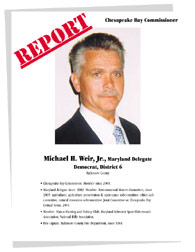 Maryland League of Conservation Voters differs in its definition of pro-conservation votes.
Maryland League of Conservation Voters differs in its definition of pro-conservation votes.
“I see all these [scored] bills as affecting the Bay as well as the greater environment,” says executive director Susan Brown. “The [flush tax] was a landmark bill. But a strong energy policy promoting renewable resources is going to alleviate air pollution, as is funding for mass transit.
“Every step, big or little, is what Marylanders are looking for from their elected officials,” she added.
Charles Fox, chairman of the League’s board of directors, has watched the Commission operate since its birth. From working on water issues as a high-ranking official in the Clinton administration, he became secretary of the Department of Natural Resources and, in that role, a member of the Commission. Fox allowed that in an occasional year, questions can be raised about how fully the scorecard reflects a legislator’s commitment to conservation issues.
“But collectively,” he said, “it truly represents the best overall evaluation of a legislator’s commitment to environmental protection.”
In the Balance
Then there are the Commission members who ace the League of Conservation Voters’ tests. Maryland’s Sen. Brian Frosh and Del. James Hubbard scored perfect 100s on the scorecard, as did Virginia Del. Albert Pollard.
They’re the other side of the balance that, their colleague Wood contends, enables the commissioners to “work together and come up with the best solution.”
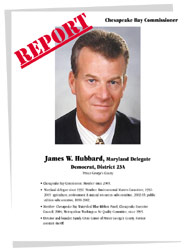 “I think it’s good to have a balance,” said House Speaker Michael Busch, who appointed Weir to succeed Weir senior on his retirement. In seeking balance, Busch says he looks at the big picture, encompassing both the Bay Commission and the Critical Areas Commission.
“I think it’s good to have a balance,” said House Speaker Michael Busch, who appointed Weir to succeed Weir senior on his retirement. In seeking balance, Busch says he looks at the big picture, encompassing both the Bay Commission and the Critical Areas Commission.
“I look at a balance of philosophies as well as location. I think it’s good to have different perspectives.
“Hubbard is very pro-regulation and environmental, while Wood and Weir are less regulatory. And they all have a love of the Bay. That’s the number-one criterion,” Busch said.
Senate President Mike Miller, too, said he achieved balance in his selections of, currently, 13-percenter Stoltzfus and 100-percenter Frosh. Frosh was named as the League’s top lawmaker in 2003.
“I put Stoltzfus on the Commission for balance,” said Miller. He’s the only member from our Eastern Shore, where all the senators are Republicans, and he represents the farmers and watermen. His score this year has improved from last year’s eight percent, so maybe he’s getting a Bay education on the Commission.”
Perhaps that is true. Said Stoltzfus: “I came from the perspective that environmentalists were radicals, and rather narrow-minded ones who didn’t see the entire picture. I think differently now. It’s been a good education for me.”
 Frosh says the Commission has on it “a pretty good cross section” of the Maryland General Assembly. “Naturally, I wish everybody thought just like me. They don’t,” he said.
Frosh says the Commission has on it “a pretty good cross section” of the Maryland General Assembly. “Naturally, I wish everybody thought just like me. They don’t,” he said.
Good, But Not Good Enough
“You work together and come up with the best solution,” said Wood, a commissioner for 13 years, describing how he sees the Chesapeake Bay Commission operating.
Wood recalled that before both Maryland and Virginia yanked their funding, the Commission’s Bi-State Blue Crab Advisory Committee, which he chaired, withstood “some serious heat” in its frank assessments of the problems afflicting the Chesapeake’s signature species.
That’s just one example members cite of the Commission’s pro-Bay activities. Over its two-decade life, they argue, the Commission has had a hand in a long list of bans, laws and agreements to restore the Bay.
Early in its life, the Commission helped initiate two major bans reckoned as two of the restoration effort’s clearest successes: One, setting the rockfish moratorium until stocks of the prized fish rebounded; Two, banning the use of phosphate detergents in the three Bay states.
In legislation, the Commission has put its weight behind Maryland’s Critical Area Act to protect the Bay’s shorelines. Additionally, the Commission has supported laws protecting wetlands and forests from development, restoring underwater grasses and restricting alien aquatic species.
The Commission has also helped draft and has signed on to all the Chesapeake Bay Agreements, including the 2000 Agreement that sets 2010 improvement goals for native oysters, wetlands and land preservation.
“Regardless of scores and diversity among members, by any measure the Commission has been hugely productive over its 20 years,” said executive director Swanson. “It’s studied all over the country for how a body of three state legislatures can be so productive.”
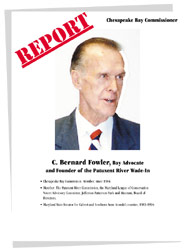 The middle-of-the-road Chesapeake Bay Foundation also praises the Commission’s work.
The middle-of-the-road Chesapeake Bay Foundation also praises the Commission’s work.
“Because some members are very pro-Bay on environmental issues and others have dismal records, it’s very powerful when they can achieve consensus,” said Theresa Pierno, the foundation’s vice president for environmental protection.
“I think it’s important to understand the Commission is not made up of advocates. They’re legislators, and the make-up of the legislatures in the three states is diverse, with Virginia one of most conservative in country. The commissioners represent what you see in those legislatures.
On many scores and by many reports, the Commission’s work is good. But is it good enough, when Chesapeake Bay consistently fails 11 out of 12 tests on the Bay Foundation’s own report card?
Wood, like other members, says the Commission shouldn’t be blamed for failures in protecting the Bay. “You also have to look at what has happened in the Bay region’s growing population over that time. Maybe we have not kept up with that. But we’ve met what our goals were at the time we set them,” he said.
Former state senator and commissioner Bernie Fowler, a pioneer in Chesapeake restoration, said the Bay probably would be worse off today if the Commission hadn’t been around.
But, according to this icon of Bay restoration, not nearly enough has been done on any score. “I‘m not alarmist,” said Fowler. “But its frustrating, disappointing, almost depressing: As hard as we’ve worked and all we’ve done, we’re being overwhelmed by human growth, animal growth, air deposition.”
Holding the line is not enough, Bay advocates say, and that’s the problem with a balanced Chesapeake Bay Commission. To the incentive of carrots, you’ve got to add the authority of a big stick.
“If I’m right, and Chesapeake Bay restoration is a political failure,” said Ernst, author and professor, “then we must look to the Chesapeake Bay Commission for answers. Its job is to identify problems and propose legislative solutions. To this day, we don’t have the laws in place necessary to restore the Bay.”
Carrie Steele contributed to this story.
to the top



 Scoring the Commission
Scoring the Commission Four of Maryland’s five commissioners are Democrats. Two of them joined Republican Sen. Stoltzfus on the failing end of the scale. Del. John Wood Jr. (St. Mary’s and Charles counties) scored 45 percent.
Four of Maryland’s five commissioners are Democrats. Two of them joined Republican Sen. Stoltzfus on the failing end of the scale. Del. John Wood Jr. (St. Mary’s and Charles counties) scored 45 percent. Fellow commissioner Michael Weir Jr., a first-term delegate who succeeded his father in the House and on the Commission, scored 67 percent, voting for seven out of nine conservation issues. In addition to the flush tax, Weir voted for higher water-quality violation penalties; holding the line on public transportation fares; environmentally friendly state purchases; and renewable energy.
Fellow commissioner Michael Weir Jr., a first-term delegate who succeeded his father in the House and on the Commission, scored 67 percent, voting for seven out of nine conservation issues. In addition to the flush tax, Weir voted for higher water-quality violation penalties; holding the line on public transportation fares; environmentally friendly state purchases; and renewable energy. Maryland League of Conservation Voters differs in its definition of pro-conservation votes.
Maryland League of Conservation Voters differs in its definition of pro-conservation votes. “I think it’s good to have a balance,” said House Speaker Michael Busch, who appointed Weir to succeed Weir senior on his retirement. In seeking balance, Busch says he looks at the big picture, encompassing both the Bay Commission and the Critical Areas Commission.
“I think it’s good to have a balance,” said House Speaker Michael Busch, who appointed Weir to succeed Weir senior on his retirement. In seeking balance, Busch says he looks at the big picture, encompassing both the Bay Commission and the Critical Areas Commission. Frosh says the Commission has on it “a pretty good cross section” of the Maryland General Assembly. “Naturally, I wish everybody thought just like me. They don’t,” he said.
Frosh says the Commission has on it “a pretty good cross section” of the Maryland General Assembly. “Naturally, I wish everybody thought just like me. They don’t,” he said. The middle-of-the-road Chesapeake Bay Foundation also praises the Commission’s work.
The middle-of-the-road Chesapeake Bay Foundation also praises the Commission’s work.